 Finding the almost hidden “Dom Basil Matthews: Nihil Omnino Christo” in the back of the CD stack in a music store and reading the liner notes, I wondered how could the producers, Gil Figaro and Joe Brown, pull off the improbable: use a mere CD to celebrate/commemorate the life work of such a multi-faceted personality as Dom Basil Matthews. Since I avoided Latin in high school, the “Nhil Omino Christo” made me cringe and wonder if a lot of ‘speaking in tongues’ and sermonizing awaited me. So the CD stared at me for over a month before I opened it one Sunday morning. And what an educational, musical, and, yes, spiritual uplift! This discovery prompted me to reflect even further on the subject. Who was this man, and from which well springs his source? Why/how (if at all) should he be remembered and celebrated?
Finding the almost hidden “Dom Basil Matthews: Nihil Omnino Christo” in the back of the CD stack in a music store and reading the liner notes, I wondered how could the producers, Gil Figaro and Joe Brown, pull off the improbable: use a mere CD to celebrate/commemorate the life work of such a multi-faceted personality as Dom Basil Matthews. Since I avoided Latin in high school, the “Nhil Omino Christo” made me cringe and wonder if a lot of ‘speaking in tongues’ and sermonizing awaited me. So the CD stared at me for over a month before I opened it one Sunday morning. And what an educational, musical, and, yes, spiritual uplift! This discovery prompted me to reflect even further on the subject. Who was this man, and from which well springs his source? Why/how (if at all) should he be remembered and celebrated?On entering the monastery at age 17 and being repulsed by the rampant poverty and illiteracy that plagued his surroundings, he engaged in deep reflection as he set out on a pilgrimage to self-knowledge that would take him from Tunapuna, his birthplace–an area that spawned so many of our organic thinkers, George Padmore, Knolly Clarke, Lloyd Best, CLR James, and others — to the foothills of Mt. St. Benedict and through Belgium and Europe, to the minefields of segregated America in the 1940s and back to the Caribbean.
Blending formal/book knowledge with his informal expertise, he became a man of action committed to transforming the world around him as he grew. It may have been in the American crucible, in the mid-1940s at Fordham University and at Katherine Dunham’s School of Dance, where he lectured, that his distinctive strand of critical pedagogy took shape as he began going beyond the confines of traditional scholarship to engage the whole person more fully. From early he privileged the importance of dance and other so-called non-academic subjects as part of his pedagogy, which became even more critical as he fostered in students a desire to examine their lived realities more critically. At the base of his praxis was creating pathways to unleashing students’ hidden potentials through through dance, music, sports, and, like a bricoleur, anything else at hand that would foster moral upliftment and self-self-fulfillment and a more profound humanity.
In the 1950s, his distinctive brand of critical pedagogy took flight through his ministering to rural communities in San Fernando and its surroundings. Little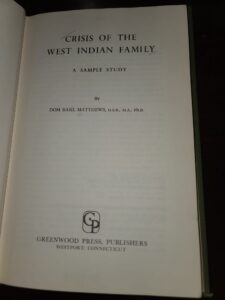 wonder, then, that in 1956, when he founded St. Benedicts College, he did not unthinkingly follow the grammar school model but understood intuitively the power of sports, business, and arts and crafts, thus fusing them with the traditional curriculum, which resulted in his creating (arguably) the first senior comprehensive school in the region. This initiative provided a blueprint for uplifting students whom polite society kept beyond the fringes of Education. Affirming this view 55 years later, former student Mungall Pastasar, who is now an Artist in Residence at the University of Trinidad and Tobago, notes: “Dom Basil Matthews… dedicated his life to educating the poor from the rural districts in South Trinidad. Many of these young boys would not have seen the inside of a college or university.”
wonder, then, that in 1956, when he founded St. Benedicts College, he did not unthinkingly follow the grammar school model but understood intuitively the power of sports, business, and arts and crafts, thus fusing them with the traditional curriculum, which resulted in his creating (arguably) the first senior comprehensive school in the region. This initiative provided a blueprint for uplifting students whom polite society kept beyond the fringes of Education. Affirming this view 55 years later, former student Mungall Pastasar, who is now an Artist in Residence at the University of Trinidad and Tobago, notes: “Dom Basil Matthews… dedicated his life to educating the poor from the rural districts in South Trinidad. Many of these young boys would not have seen the inside of a college or university.”
By fashioning a pedagogy that positioned the oppressed and downtrodden at the center of the struggle for social justice and educational equity, the Dom employed Education as his weapon to engender personal and societal transformation in his quest to move beyond the dogma of the Trinity, Church, State, and pretense of progress. Once he was ordained, in 1935, as the first Benedictine priest of color—about which he later quipped, “[the masses] probably liked the idea of some chocolate topping on all that vanilla ice cream”– he began recasting his ministry as a powerful instrument to mitigate the prejudices and social inequities which bedeviled both the Catholic Church and the wider society.
Though a Benedictine monk, he was no apologist for the irresponsible elite and rejected religious exclusivity. He refused to accept the ‘corner of the box’ in which colonial and neocolonial society wanted to imprison the downtrodden. As Gil Figaro, founder of the Sunshine Awards, suggests, his life was one of challenging the status quo and defying the various layers of bureaucracy/establishment, especially regarding education.
Last September marked the centennial of Dom Basil Matthew’s birth and our first Prime Minister, Dr. Eric Williams (The Doc). While the historic 1954 public debate between “The Doc” and “The Dom,” which attracted thousands of people of every ‘creed and race,’ is credited with ushering in the idea of mass popular Education in T&T, one shudders thinking of the state of debating in today’s parliament. The fact that one commentator on the 1954 debate referenced it as the equivalent of the famous Lincoln-Douglas (1858) debates in the U. S. is all the more reason why “now is time” for reevaluating the import of the signature 1958 debate on our nation’s maturation. Yet, after 50 years of independence, too much can’t–politics, sophistry, mamaguism–and the ole talk of traditional intellectuals hinder a disinterested evaluation of this landmark event in the nation’s history.
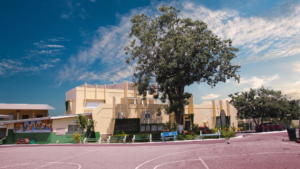
Mount St. Benedict Monastery
Some claim that though The Doc was a brilliant historian and understood the need for critical discourse in the polity, he nevertheless had an absurd way of silencing those who crossed his path, as he perceived The Dom did by ‘pushing’ the Catholic Church’s position in the Great Debate. Who can forget Williams’s attempt to muzzle and isolate CLR James—even putting him under house arrest– and The Doc’s dismissively referring to CLR as “a mere pamphleteer.”
The Roaring Tiger was another victim of The Doc’s wrath. Rawle Gibbons in ‘No Surrender: A Biography of the Growling Tiger’ helps us remember Tiger and also explains that Tiger’s “offense” was parodying The Doc’s one-day marriage in song. It’s uncertain if Williams ever viewed The Dom’s quip, “Common law marriage isn’t law, it’s just common,” as being aimed at him or as too traditional and Catholic. Still, there is the sense that our renowned historian may well have dismissed the Dom as a mere Catholic. Interestingly, in a recent article in DigDrumNation, Caldwell Taylor contests the simplistic and reductionist view promulgated of the Dom as only being remembered for “a cameo appearance in the meteoric rise of Dr. Eric Williams in the 1950s.”
Against this backdrop, “Dom Basil Matthews: Nihil Omnino Christo” is welcomed as it disturbs the silence and lack of critical discourse surrounding Dom’s true legacy–both in the popular imagination and even more curiously in the academy. This production is a distinctive collection with some of the best Caribbean artists–The Mighty Sparrow, Chalkdust, Mungal Patasar, Tabou Combo, Geroge Victory, Charmaine Yeates, and Designer—lending their voices to help in remembering and repositioning the indomitable Dom in the historical register.
By skillfully samplin’ and repositioning Dom’s voice as the intro and outro to each song, the producers, Gil Figaro and Joe Brown, extend the bounds of the ‘call-and-response’ by creating a communicative community between the performers and the spoken word from some of the Dom’s most memorable, yet unheralded, speeches. This deft blending of voices prompts one to reimagine the Dom as the quintessential spoken word artist. Perhaps this is best captured in the give-and-take with Sparrow, which begins with Dom’s sonorous voice:
‘How can we win a piece of the world and keep our soul? This is what authentic Education is all about; this is what life that is worth living is all about.’
Emoting the feel of a mock duel in a calypso tent, Sparrow responds with his timeless classic:
‘Education, Education this is the foundation/ Our rising population need sound education/Knowledge is the key to success…‘
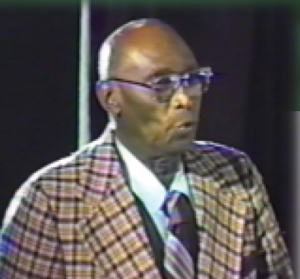
Dom Basil Matthews
And, as the final bars, ‘Education would light up your way/ Don’t allow idle companions to lead you astray/ To earn tomorrow you have to learn today;‘ of Sparrow’s education road march ring out, there’s the sense of witnessing a transmutation: A seamless blending of voices of two illustrious sons of the soil despite a muted duel over the message: Does Sparrow’s pragmatism encapsulate Dom’s vision of moral upliftment? Were the alchemists able to prevent open conflict between voice and message?
As Sparrow’s voice fades and the Dom frees himself from a time outside of time, filtering through the speakers, one hears:
St Benedict’s College was put down to help students find answers to …questions and to live with success.
Extending the dialogue over time and space, former student Stephen James testifies:
The Dom… inspired me to say WHEN rather than IF.
Still, one wonders if our spoken word artist was ribbing Sparrow or whether, in this virtual ‘tent,’ he was issuing a call to the following speech performance with:
Here is part of the answer as I see it.: Focus on the right goal and the right values/ Keep moving toward that goal and don’t block traffic/Don’t just keep moving plan; plan every move that you make/ Pick the right tools; no tools, no job/ Push with might…/And for God’s sake, hang in there!
And, as Dom’s voice transitions into the Mighty Chalkdust’s, the opening riffs remind us of the stellar work of ace arranger Art de Cateau. Picking up the mic and answering the call of self-fulfillment through Education, Chalkdust provides us with lyrics to hang in there and ready oneself for the righteous fight. His voice, trembling with anger/resentment, is revealed:
…Nowadays as you mention science or an invention/ Many people does feel that it come from the white man/ They think that is whites only who created technology… but what the damn fools don’t know is that blacks created things also.
One can sense how these vibes from “Black Inventions” may have resonated through the Dom for, as a rare black in the ministry of his time, he knew, up close, his people’s struggles to reject and escape the badge of servitude. Exploding the corrosive stigma of racial prejudice that bedeviled his people, even today, he asserts from way beyond the surrealist-like music of the CD:
It is sometimes alleged—not without some foundation in the history of the cultural conflict of the Negro in the New World—that Negroes do not wish to be ministered to by priests of their race. To say that in this year of grace and achievement, 1946, is a vicious form of propaganda.
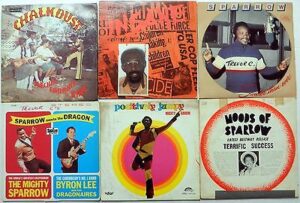 Propaganda? Hear Chalkie, but now more like the new Dom, as a spoken word artist, on the liner notes. This compact disc marks an age when British-educated sons sought, through a renaissance of alternative Education, to end colonial and neo-colonial thinking. Dom Basil Matthews was one such.
Propaganda? Hear Chalkie, but now more like the new Dom, as a spoken word artist, on the liner notes. This compact disc marks an age when British-educated sons sought, through a renaissance of alternative Education, to end colonial and neo-colonial thinking. Dom Basil Matthews was one such. And before one can wonder if Chalkie, as MC in this futuristic kaiso tent—that juxtaposes voices, voice fragments, and images to unearth new meaning—can also mediate the mock duel over educational vision between Sparrow and the Doc, we hear another line from Chalkie’s magnum opus compelling us to be the change we believe we can become….
But in books today, Black people’s works aren’t shown.
It’s a tribute to the performers and all those responsible for this CD that we think deeply about socio-cultural patterns through an emancipatory lens and challenge the historical registers by mining the archaeology of our dangerous memory. How many pre- and post-secondary education textbooks mention Dom Basil Matthews—even as a footnote? Have all the Dom’s biographies been stolen from our library bookshelves?
If, as Black Stalin insists, there’s nothing as ‘just another kaiso,’ then this CD demonstrates that Nihil Omnino Christo is not just another CD—and not merely a testimonial. It’s a proto-auto/biography and a substitute/replacement for all the unknown DBM books from our libraries. Now is the time for the government to increase funding for Library Services so that stolen books, etc., can be replaced. And when shelving the latest acquisition, “Nihil Omnino Christo,” librarians should place the same label on the missing DBM books: “Steal this CD!”
Each of us has a special talent that no one else has; put that talent to work as no one else can. None of them gave that talent to you, only God. None of them can take it. Right on!
As DBM’s words floated through my place of refuge that Sunday morning, I felt as if I, too, were one of his students at St. Benedict’s College, being moved by this sermon. This peroration still resonates through his students—some of whom may not have passed the Common Entrance Exam—whose words adorn this reflective and eye-opening CD.
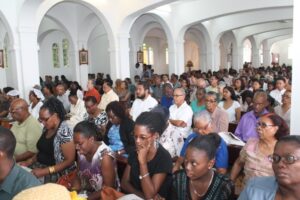
Mount St. Benedict, St. Augustine, Trinidad
Borrowing the mic from Chalkdust and making a cameo-like appearance, Mervyn Francis, who attended St. Benedicts from 1966 to 1971, interjects, “I remember Dom telling me in my mother’s presence, ‘If I am not making the progress that I am capable of making, it is simply because my goals are not clearly defined.'”
But wait. Is all this happening for true? Dismissing the question—something the Dom may never have done in life—as he prepares to speak, it’s as if one hears piping through the speakers. Destiny is not a matter of chance; it is a matter of choice.
And one is left wondering if the Dom could get his words through or if it was one of his students, Patrick Edwards, now a diplomat, completing Mervyn’s reminiscence. Demonstrating his mastery of wit and a readiness to engage any calypsonian in a duel, The Dom intones:
Where talent is concerned, there is no such thing as a Common Entrance; there is only a special entrance, and the unique entrance is you and you alone.
As Dom’s words and the deft turn of phrase reverberate, one reads on the CD booklet:
Goal setting is the most potent human force for self-motivation, and it works in two ways: you work on them, or they work on you.
One wonders if the words are Dom’s words or those of his former student, Mervyn Francis. Above all, “Nihil Omnino” provides the answer.
Though this remembrance is not an attempt to canonize The Dom still, words alluding to human frailty ring out: “The tragedies of [The Dom’s] life in no way diminished the exuberance of his wishes.” There is no scandal here. Yet, on this montage that is the CD, written testimonials of former students and a cross-section of the community; pictures of the school’s music band, teachers, and students; and a touching collage of some of the school’s “fallen heroes who are now waiting to welcome us into heaven”; converge and speak through the music in one voice. One gets the sense that this work is grounded in the interconnectedness of all inhabitants—past, future, and present.
*A slightly different version of this article was published in Everybody’s Magazine in November 2011.
• Nuff Respect and thanks to Gil Figaro for facilitating the writer at the Dom Basil Matthews Research Institute, Teaneck, NJ.
 Finding the almost hidden “Dom Basil Matthews: Nihil Omnino Christo” in the back of the CD stack in a music store and reading the liner notes, I wondered how could the producers, Gil Figaro and Joe Brown, pull off the improbable: use a mere CD to celebrate/commemorate the life work of such a multi-faceted personality as Dom Basil Matthews. Since I avoided Latin in high school, the “Nhil Omino Christo” made me cringe and wonder if a lot of ‘speaking in tongues’ and sermonizing awaited me. So the CD stared at me for over a month before I opened it one Sunday morning. And what an educational, musical, and, yes, spiritual uplift! This discovery prompted me to reflect even further on the subject. Who was this man, and from which well springs his source? Why/how (if at all) should he be remembered and celebrated?
Finding the almost hidden “Dom Basil Matthews: Nihil Omnino Christo” in the back of the CD stack in a music store and reading the liner notes, I wondered how could the producers, Gil Figaro and Joe Brown, pull off the improbable: use a mere CD to celebrate/commemorate the life work of such a multi-faceted personality as Dom Basil Matthews. Since I avoided Latin in high school, the “Nhil Omino Christo” made me cringe and wonder if a lot of ‘speaking in tongues’ and sermonizing awaited me. So the CD stared at me for over a month before I opened it one Sunday morning. And what an educational, musical, and, yes, spiritual uplift! This discovery prompted me to reflect even further on the subject. Who was this man, and from which well springs his source? Why/how (if at all) should he be remembered and celebrated? wonder, then, that in 1956, when he founded St. Benedicts College, he did not unthinkingly follow the grammar school model but understood intuitively the power of sports, business, and arts and crafts, thus fusing them with the traditional curriculum, which resulted in his creating (arguably) the first senior comprehensive school in the region. This initiative provided a blueprint for uplifting students whom polite society kept beyond the fringes of Education. Affirming this view 55 years later, former student Mungall Pastasar, who is now an Artist in Residence at the University of Trinidad and Tobago, notes: “Dom Basil Matthews… dedicated his life to educating the poor from the rural districts in South Trinidad. Many of these young boys would not have seen the inside of a college or university.”
wonder, then, that in 1956, when he founded St. Benedicts College, he did not unthinkingly follow the grammar school model but understood intuitively the power of sports, business, and arts and crafts, thus fusing them with the traditional curriculum, which resulted in his creating (arguably) the first senior comprehensive school in the region. This initiative provided a blueprint for uplifting students whom polite society kept beyond the fringes of Education. Affirming this view 55 years later, former student Mungall Pastasar, who is now an Artist in Residence at the University of Trinidad and Tobago, notes: “Dom Basil Matthews… dedicated his life to educating the poor from the rural districts in South Trinidad. Many of these young boys would not have seen the inside of a college or university.” Propaganda? Hear Chalkie, but now more like the new Dom, as a spoken word artist, on the liner notes. This compact disc marks an age when British-educated sons sought, through a renaissance of alternative Education, to end colonial and neo-colonial thinking. Dom Basil Matthews was one such.
Propaganda? Hear Chalkie, but now more like the new Dom, as a spoken word artist, on the liner notes. This compact disc marks an age when British-educated sons sought, through a renaissance of alternative Education, to end colonial and neo-colonial thinking. Dom Basil Matthews was one such. 


